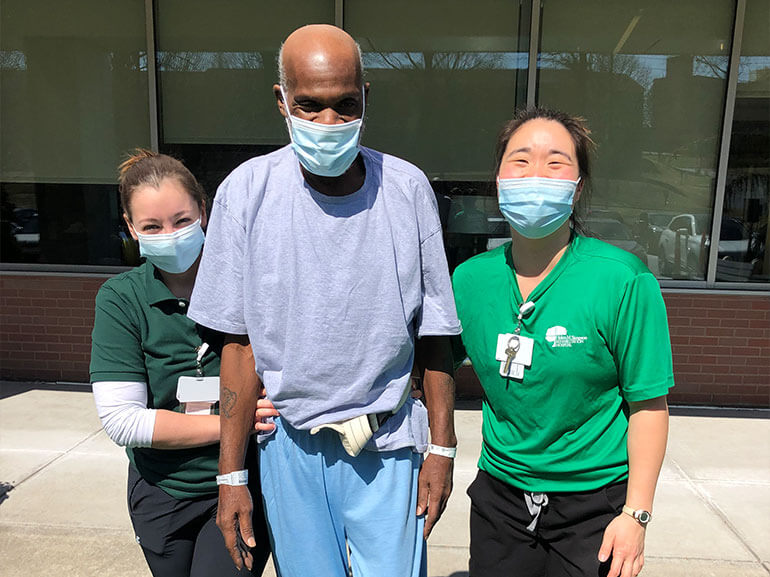Kim's story

Born and raised in Harrisburg, Pennsylvania, Kimberly “Kim” Diggs, 64, is a husband, father of four and grandfather of 16. Kim worked as a forklift driver in a warehouse and in his free time enjoys hanging out on his porch, watching TV and movies with Audra, his wife of 20 years, and going to the casino. Kim’s life changed dramatically when he experienced seizure-like activity that required his heart to be shocked back into a normal rhythm five times. The interruption of blood flow to his brain that happened during the cardiac incidents caused a brain injury.
Kim was admitted to a local emergency department, then transferred to the intensive care unit after being sedated and intubated. His stay lasted nine days and included treatment for COVID-19 and the placement of a feeding tube to ensure he received adequate nutrition.
After two weeks in the hospital, Kim was ready for discharge and was recommended to an intensive rehabilitation program. Audra wanted Kim to have the best chance possible to make a full recovery, so the decision was made to transfer him to Helen M. Simpson Rehabilitation Hospital.
Upon arrival, Kim required the assistance of two people to complete daily living activities, including walking, bathing, dressing and using the bathroom. He was also struggling with his vision, speech, balance and ability to understand instructions. Kim’s physician-led multidisciplinary team of nurses, physical, occupational and speech therapists, as well as a neuro-optometrist, devised a plan to help him return home safely.
Physical therapists worked with Kim on walking, stair training, intensive balance activities and fall recovery. In occupational therapy, Kim and his therapists focused on balance training during dressing, vision exercises, coordination training and repetition of daily self-care activities. Kim found speech therapy particularly challenging at first, but soon was motivated by the fact that he was able to speak more clearly and eat and drink a more normal diet.
Kim found Audra’s encouraging and supportive presence during therapy sessions particularly helpful. Audra expressed how appreciative she was to undergo family training so that she knew how to assist Kim when he returned home. Audra noted that she saw a turning point for Kim during his first week of speech therapy when he was able to begin speaking again. She said that while it was still difficult to understand him at that point, she was happy to see his improved effort to communicate and verbalize his needs. A significant moment for Kim happened during his second week of rehabilitation when he started processing and understanding his therapy sessions and began asking, “How am I doing?” As he progressed, some of Kim’s favorite therapy activities and exercises included boxing and playing basketball to improve his balance.
With hard work, dedication and support from his family and therapy team, Kim progressed with his balance as well as his visual and cognitive processing. Kim never missed a day of therapy during his rehabilitation stay and his hard work paid off. When he left the hospital after a four week stay, Kim was able to complete all self-care activities as long as someone could assist him with his balance. He could also walk and manage stairs with his wife next to him, could eat and drink a more normal diet and was able to carry on a conversation with less difficulty. Kim was most excited to get back to his routines at home, including sitting on the front porch in his favorite chair and resuming his visits to the casino.
Throughout his time at Helen M. Simpson Rehabilitation Hospital, both Kim and his wife said they were overwhelmed by the amount of support from their family. His wife said they were very grateful for the love and prayers they received, adding, “Everyone here on the rehabilitation team has been excellent and has helped bring my husband back.” When asked to reflect on his experience and offer any words of advice for others, Kim shared, “Don’t give up and believe in yourself.”